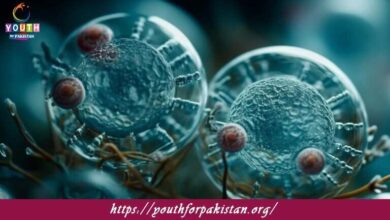9th Class Biology Chapter 2 Quiz with Answers

The 9th Class Biology Chapter 2 Quiz Solving a Biological Problem introduces students to the important steps of the scientific method, which is a crucial concept for the MDCAT biology section. This chapter focuses on how scientists solve biological problems through observation, hypothesis formation, experimentation, and conclusion. These steps are very important for MDCAT students since questions about experimental design, data interpretation, and problem-solving regularly appear in the MDCAT Quiz. The importance of variables, controls, and data analysis in biological research must also be learned by the students.
This unit emphasizes the role of hypothesis testing and data collection in solving real-life biological problems, such as disease control, environmental protection, and food production. The scientific method is taught in a step-by-step approach, from identifying a problem to testing solutions. Detailed examples from biology, such as Louis Pasteur’s experiment in disproving spontaneous generation, make it easier for students to relate theory to practical applications. Practicing MDCAT quizzes on this chapter ensures that students can solve problem-based questions confidently.
How Chapter 2 Helps in MDCAT Quiz Preparation
Chapter 2 is especially important for medical entrance exams because it teaches students how to think critically and apply logical reasoning to biological scenarios. The scientific method forms the basis of research in medicine, pharmaceuticals, and biotechnology—fields that are closely linked with the MDCAT syllabus. To excel in the MDCAT Quiz, students need to be well-versed in concepts such as deductive reasoning, inductive reasoning, and the importance of reliable data. This would further help in attempting problem-solving questions on a day-to-day basis, which will surely enhance their analytical thinking and, therefore, performance in exams.
Solving a Biological Problem Quiz for MDCAT
The MDCAT quiz on Solving a Biological Problem will encompass major topics related to scientific inquiry, hypothesis testing, and the interpretation of data. These quizzes really help students gauge their understanding of experimental design, variables, and controls. The following chapter-specific quizzes allow the students to realize patterns in biological problems and make a proper application of the solutions during the actual exam.
- Test Name: 9th Class Physics Chapter 2 Quiz
- Type: Quiz Test
- Total Questions: 30
- Total Marks: 30
- Time: 30 minutes
Note: Answer of the questions will change randomly each time you start the test, once you are finished, click the View Results button.
Free Flashcard for Solving a Biological Problem
Using free flashcards for Solving a Biological Problem is a great way to memorize the steps of the scientific method, key definitions, and famous experiments. Flashcards make it easier for students to recall critical concepts like observation, hypothesis, control group, and dependent variables during the MDCAT exam. Regular use of flashcards improves retention and boosts students’ confidence in solving quiz questions.

How would you determine the impact of noise pollution on the behavior of a nocturnal animal species?
Monitor noise levels, study animal behavior, and assess population trends

If a crop is failing to yield the expected harvest, how would you investigate potential soil nutrient deficiencies?
Analyze soil samples, study plant growth, and assess nutrient levels

How would you investigate the impact of habitat fragmentation on a population of large mammals?
Study changes in habitat structure, population size, and animal movement

If a patient is experiencing allergic reactions to a medication, how would you identify the allergen and find an alternative treatment?
Conduct allergy tests and explore alternative medications

How would you investigate the impact of a new agricultural pesticide on non-target insect species?
Conduct controlled experiments and monitor non-target insects

If a population of insects is damaging crops, how would you develop a sustainable pest management strategy?
Implement integrated pest management, use biological controls

How would you investigate the impact of climate change on the migration patterns of a bird species?
Monitor temperature changes, study migration routes, and observe behavior

If a population of plants is failing to reproduce, how would you investigate potential pollination issues?
Study pollinator activity, observe flower structure, and assess environmental conditions

How would you investigate the impact of air pollution on respiratory health in a human population?
Analyze air quality data, study respiratory conditions, and assess medical records

If a population of animals is showing signs of a new infectious disease, how would you identify the causative agent?
Collect samples, conduct laboratory tests, and identify the pathogen

How would you investigate the factors contributing to the decline of coral reefs in a specific region?
Study water quality, temperature, human activities, and coral health

If a population of birds is exhibiting abnormal behavior, how would you investigate the potential role of environmental contaminants?
Analyze pollutants in the environment and observe bird behavior

How would you determine the impact of a new agricultural practice on soil health?
Monitor soil composition and observe changes in plant growth

If a species of plant is invasive, how would you develop a strategy to control its spread and protect native flora?
Implement removal programs and barriers

How would you investigate the factors contributing to a decline in pollinator populations?
Study habitat changes, pesticide use, and climate

If a patient is not responding well to a specific medication, how would you investigate the possibility of drug resistance?
Conduct genetic tests and assess patient history

How would you determine the impact of ocean acidification on marine life?
Monitor pH levels and study changes in marine ecosystems

If a population of amphibians is experiencing a decline, how would you investigate the potential impact of environmental toxins?
Analyze water and soil for toxins, study population trends

How would you investigate the role of a specific gene in the development of a genetic disorder?
Use genetic knockout experiments and study affected individuals

If a cell culture is contaminated, what steps would you take to identify and eliminate the source of contamination?
Identify and discard contaminated cultures, sterilize equipment

How would you study the impact of deforestation on the population of a particular animal species?
Monitor changes in habitat, population size, and behavior

If a species of fish is overfished, how would you develop a conservation strategy to protect the population?
Implement fishing regulations, establish marine reserves

How would you investigate the effectiveness of a new vaccine in preventing the spread of a viral disease?
Conduct controlled clinical trials with vaccinated and unvaccinated groups

If a population of insects is damaging crops, how would you develop an environmentally friendly solution?
Introduce natural predators, use organic pesticides

How would you investigate the impact of climate change on a specific plant species?
Monitor changes in temperature, precipitation, and plant population

If a forest ecosystem is experiencing a decline in biodiversity, how would you investigate the contributing factors?
Study habitat changes, human impact, and species interactions

How would you determine the effect of a new pesticide on non-target organisms in an agricultural setting?
Conduct controlled experiments and monitor non-target species

If a patient is exhibiting symptoms of a disease, what steps would you take to diagnose the condition?
Conduct medical tests, analyze symptoms, and consider medical history
Experience the real exam environment with our expertly designed collection of over 25,000 MCQs MDCAT Mock Tests.





